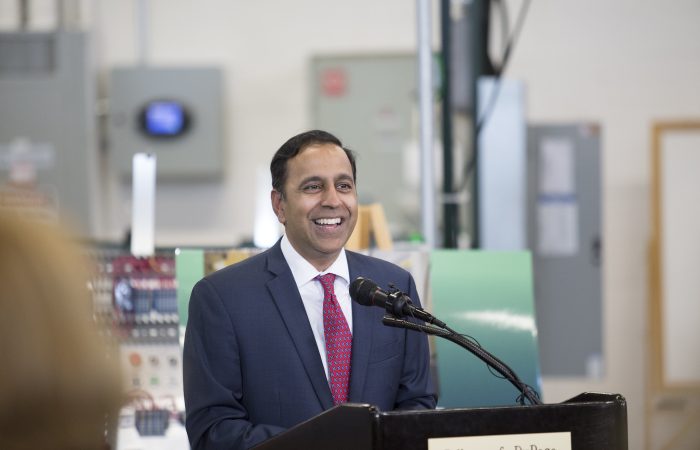On November 6, 2023, the Center for Strategic & International Studies (CSIS) hosted a fireside chat with Congressman Raja Krishnamoorthi, the ranking member of the House Select Committee on the Strategic Competition Between the United States and Chinese Communist Party (thereafter the “China Committee”). Jude Blanchette, Freeman Chair in China Studies at CSIS, moderated the discussion with Rep. Krishnamoorthi. During the event, Rep. Krishnamoorthi presented the recent updates on the China Committee and shared some of his personal views about broader U.S. policy on China.
When asked about the work done by the China Committee, Rep. Krishnamoorthi first highlighted two Committee reports, respectively titled “Ten for Taiwan” and “The Chinese Communist Party’s Ongoing Uyghur Genocide.” According to Rep. Krishnamoorthi, many suggestions in the former report eventually made it to the National Defense Authorization Act for Fiscal Year 2024 (FY24 NDAA) which is still under legislative deliberation in Congress. Going forward, the China Committee also hopes to translate the latter report into legislation.
Rep. Krishnamoorthi also explained how the China Committee is working on the “complicated and messy” economic issues related to China and is receiving constant input from constituencies and stakeholders. Many U.S. companies, for example, have sought more guidance and clarity in U.S. rules and regulations on investment in China. When asked about whether certainty is at all possible concerning these rules, Rep. Krishnamoorthi said that the Committee hopes to provide more predictability to U.S. companies, but cautioned that a ‘negative list approach’ is unlikely despite wishes from the business community. To prevent China from evading controls, Rep. Krishnamoorthi prefers a “more sectoral approach than a list approach and a countrywide approach as opposed to just a region or a place.” Furthermore, the United States is still working to understand the impacts and potentials of cutting-edge technologies such as artificial intelligence. In those aspects, certainty is unlikely to occur “at the start” and private investors will have to “wait a little bit.”
As a pushback to some of the stakeholder concerns, Rep. Krishnamoorthi said that the China Committee hopes to “educate” U.S. companies and investors that U.S. investment in China is “not just about money,” but also about “technology, know-hows, and values.” Specifically, Rep. Krishnamoorthi argued that should clients, for example, learn that the Thrift Savings Plan “has funds invested in companies or subsidiaries of companies that are associated with modernizing the People’s Liberation Army or involved in perpetrating the Ugyhur genocide,” they would have condemned the decision and demand such investment flows to stop. Ultimately, Rep. Krishnamoorthi said that the Committee will aspire to “find the boldest common denominators” on economic issues, deliver policy recommendations, and “shepard [the recommendations] through the committees of jurisdiction.”
Next, the fireside chat addressed broader U.S. policy on China and the Congressman’s own views on the matter. When asked about what “winning” the U.S.-China competition might look like, Rep. Krishnamoorthi hoped that the U.S.-China relationship could reach more of an “equilibrium,” where risks of armed conflict are low. He notably reiterated the importance of avoiding armed conflicts several times during the overall discussion. In line with this pursuit for de-escalation, Rep. Krishnamoorthi stressed the importance of high-level dialogues, the reestablishment of military-to-military communications, and people-to-people exchanges. According to Rep. Krishnamoorthi, only by having U.S.-China dialogues can the United States “explain the consequences” to China if Beijing continues “provocative actions.”
Concerning specific next steps on the United States’ strategic competition with China, Rep. Krishnamoorthi listed a number of policy priorities: (1) preventing Beijing’s military aggression in the South China Sea and Taiwan Strait; (2) addressing economic concerns such as dumping, IP theft, cyber hacking and “problematic” U.S. outbound investment in China; (3) “do[ing] whatever we can on the human rights front”; (4) fixing the U.S. immigration system to retain talents, and (5) increasing investment in U.S. innovative leadership. Rep. Krishnamoorthi acknowledged that despite a shared “sense of urgency” to address challenges related to China, Democrat and Republican lawmakers on the Hill might have differences “in terms of emphasis.” Specifically, he said Republicans are uncomfortable with the amount of dialogues between U.S. and Chinese governments, and may “fear” that industrial policies will lead the U.S. to do “some of the things that we are concerned that the CCP does.”
When asked whether Americans are prepared to support U.S. industrial policy and “make some of the sacrifices necessary,” Rep. Krishnamoorthi said it is possible, but added that there is a need to “elevate the issue” and connect it to “everyday concerns” such as data privacy, IP theft and human rights concerns. According to Rep. Krishnamoorthi, the American people who he talked to want “smart action that leads to progress” on the aforementioned concerns, but “without leading to some kind of spiraling conflict with the Chinese.”
Looking forward to 2030, Rep. Krishnamoorthi hoped that, by then, the U.S. will have avoided an armed conflict and have worked on diversifying supply chains and addressing other economic concerns. Additionally, Rep. Krishnamoorthi hoped to “see signs that the CCP—or at least the PRC as a whole—is moving a little bit closer to the original aspirations that allowed us to agree to their accession to the WTO.” According to Rep. Krishnamoorthi, the vote for China to join the WTO did not lead to “more openness and freedom in China,” and the United States now needs to protect its interests and “give a chance, maybe, for something positive to happen in the future.”




